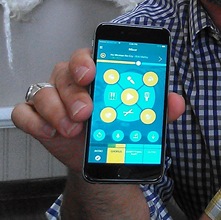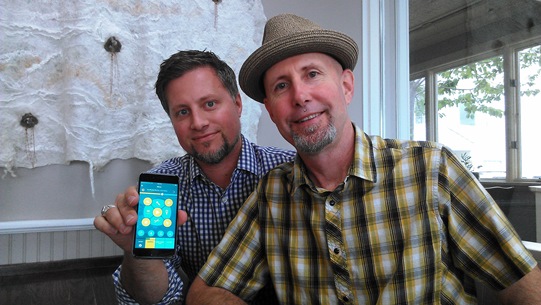— by Margie Doyle —
8Stem — a new music format that brings interactivity and sharing to a new level for a new generation of music lovers — is the creation of local Orcas music producers Adam Farish and Bruce Pavitt.
The pair have written a new music format and music player (App) that does more than bring music to the listener, as did vinyl records, 8-track tapes, cassettes, CDs, mp3 players in the past. 8Stem is their name for the digital format that “revolutionizes the music experience,” says Farish.
Now people will be able to customize and remix music on their mobile devices. While music streaming services have become increasingly popular, as a delivery method it has at least two drawbacks, according to the local music producers and entrepreneurs: streaming is for the passive listener; and it offers very little reward to the artist who created the streamed event.
Music has lost 60-plus percent of its revenue since 2001 said Farish. “The existing format has failed to meet the needs and values of the upcoming generation.” Specifically, a vital element for the music audience now is engagement by the listener with the musician, and sharing the result on social media.
“The general consensus is streaming is destroying the music business because there is such a small split between the listener, who is essentially ‘renting’ the music, and the artist. We’re concerned about getting their rightful earnings to the artists. And so we’re changing the model at the same time as providing a new source of crowd-sourced content.”
So what is 8Stem? It’s a format that gives the listener access to specific elements of a song so that they can customize it to their own tastes, play with it, and even add their own content to an existing musical work. Stem files are a standard that professional music producers have been using for over a decade, and represent groupings of multiple audio elements on a single audio file. Multiple stem files playing simultaneously make up a complete song. Farish, who wrote the format, structured the 8Stem application to incorporate 8Stem files (bass, vocals, instruments, percussion, and 4 additional elements) as the standard. “It makes sense in terms of audio architecture and engineering,” says Farish. “We just took what producers have been doing in recording studios and put that same functionality in an iPhone.”
Rather than the music producer/creator hiring musicians, vocalists, engineers and so on, to create a finished song, “music becomes dynamic and interactive, all subject to input of the individual users,” says Pavitt.
“It’s a consumer driven format, turning the stem files on or off to change the configuration of a song to personalize it,” Farish adds.
The 8-button design distinguishes each of these elements, as the producers displayed with a 70s reggae song, turning on and off the vocals, the bass, the instruments and allowing the app users to personalize, customize and share their own version of the song.
8Stem is “a multiple value proposition, in that the social capital of creating something that other people like and share is valuable. In this format, the value is changing from the music you want to consume to the music you want to experience,” Farish adds.
The 8Stem app is the result of the creative imaginations of two guys from Orcas: Adam Farish, owner of the Outlook Inn, who grew up on Orcas, (and has also held various positions in the music industry for nearly 20 years); and Pavitt, founder of the legendary SubPop independent music label which signed Nirvana, Soundgarden and Mudhoney and many other bands from the “grunge” music scene of the late 1980s and 1990’s. The pair met at a Children’s House fundraiser in 2003 and spent the next decade talking about the future of music.
The pair has worked to design the 8Stem app for over five years. “We knew there needed to be a mobile device that was capable to deliver the 8Stem structure, and it wasn’t until IOS 6, in late 2012, that the capability was there, said Farish. “We’ve now gone beyond the conceptualization; we’ve built the app, which is now in closed testing.”
In “decentralizing” the music delivery process, the artist who creates the music will stipulate how many options are available to the interactive user. Farish and Pavitt are now finalizing the business aspect of starting their technology company. They are represented by a legal technology firm; have formed an advisory board that includes a former Vice-President of AT&T and Amazon, and recently hired their Chief Technology Officer (CTO). 8Stem is nearly finished with their seed round of financing.
They recently engaged major music label executives to discuss content partnership, in line with their determination to “build an ecostystem of sharing the music that is hugely beneficial with them,” rather than setting up a competitive entity that is eventually bought out, taken over, or sued out of existence.
Potential investors can learn more about how to join the latest music revolution by contacting Farish at adam@8stem.com.
“We’re going to revolutionize the music industry — again!” says Farish, with a nod toward Pavitt’s record-breaking venture into bringing the “Seattle sound” to world audiences with SubPop.”The story will continue.”
**If you are reading theOrcasonian for free, thank your fellow islanders. If you would like to support theOrcasonian CLICK HERE to set your modestly-priced, voluntary subscription. Otherwise, no worries; we’re happy to share with you.**










I salute you, brothers!! Nice work! A music revolution is definitely in order. But I strongly don’t feel streaming music is an enemy. It’s just a delivery mechanism and we are not yet even in its infancy. Streaming is the inevitable near future. Look at Netflix, apple music, Amazon…..Embrace it! You can do what you are doing with streaming as well. I wish you all the best in your endeavors!!
It’s inspiring to see this technology entrepreneurship happening on the island…good fortune to 8Stem!
Always a step ahead of your years, Adam and congrats Bruce for being so innovative. All the best to you in your venture. Always an adventure. Good Job! Cheers, Denise Wilk